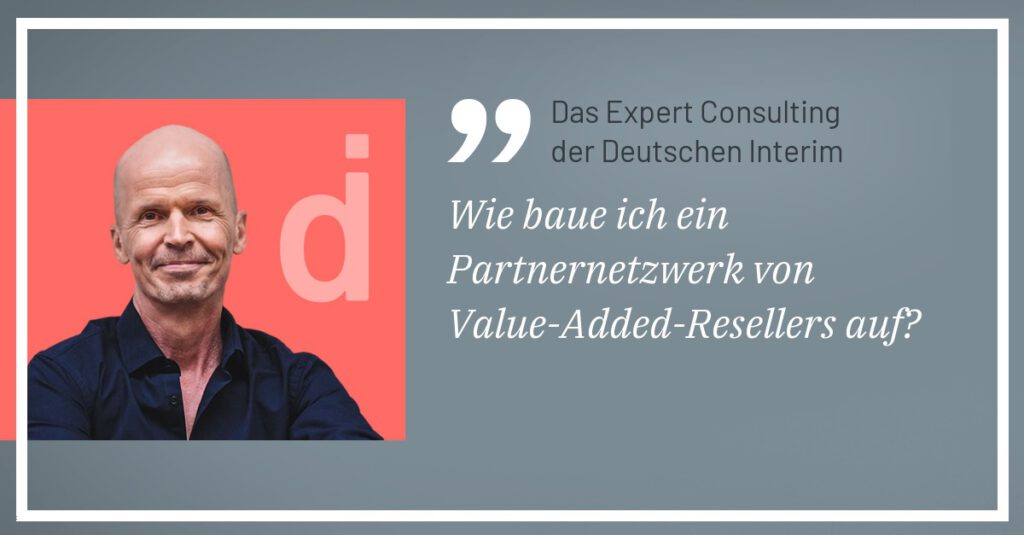Especially if you want to expand your sales activities and also become more international, you ask yourself the question: What do I want or what am I really able to invest? Certainly, large corporations can answer this question more easily and usually immediately establish local branches and hire complete teams. As a startup or even a medium-sized company, you naturally shy away from such investments or cannot even afford them. This is why many companies especially in the B2B sector decide to sell their products via indirect sales, i.e. via a partner channel. Ideally, these partners are not only distributors or resellers, but also offer the customer an added value. This could be, for example, installation and customer-specific configuration of a product, individual consulting, local after-sales support or similar services.
Defining the target market and target group
Selecting the right partners for the reseller network depends primarily on the target market and the target group for the product. First of all, you have to decide in which countries and regions you want to start selling your product and thus building the partner network. Sure, you can sell most products in any country, but as a first step, focusing on the countries with the lowest entry barriers definitely makes most sense. These could include legal restrictions, but also language and cultural barriers. Then you very often hear the phrase “our product can be used by everyone”. But also here a clear focus on target group, company size and industry is important in order to be able to develop a clear sales strategy. The current customer base is always a good indicator to define the ideal target group. This target group then helps to find the ideal sales partners.
Definition of the ideal reseller
If you work in the software industry, for example, and you focus on smaller companies as customers, it makes little to no sense to try to acquire large IT system integrators as partners. So the question arises as to what is the ideal reseller profile in order to address my target group. Which resellers already have a good amount customers who correspond with my target group? Which potential partners already have products in their portfolio that are a good match for our product? The ideal partner should also offer the added value that our customers expect for our product. For example, if our product requires a high degree of customization, the reseller should also have the necessary resources and technical expertise to implement these customizations. There is also the question of how many resellers we really want and need. Do we look for quantity or quality? Do customers expect local proximity of the reseller or does our product even require that? And not entirely irrelevant for the selection of the right partners is the question of what we have to offer apart from a few percentage points of reseller discount.
Acquisition of resellers
The acquisition of resellers can be approached in various ways. If you already have a certain level of awareness as a company, for example due to a very attractive product, it is quite possible that many potential partners will proactively get in contact. You can then support this with targeted online activities and select the right candidates in advance before you enter into further discussions. For companies that are new to the market, however, this often means going into cold calling. If the necessary sales resources are available internally, you can take this into your own hands. But very often it can also make sense to bring an external service provider on board who specifically contacts a large number of potential resellers with the ideal profile. Those who are interested can be forwarded then to the company’s own sales team for further discussions.
Developing the resellers
Once you have found the right partners, selling through them won’t be a sure thing. Most of them already have an existing product portfolio and will always sell the products and solutions first they feel competent and confident with. This means that, especially in the beginning, you have to invest a lot of time in training and support, both from a sales and a technical perspective. The quality of the partner onboarding determines the future success of a partnership at a very early stage. This also includes a common sales target and joint marketing planning. And very important: the rights and obligations of both sides should be clearly defined in both a partner contract and a partner program. The latter in particular should be well thought through and, as already mentioned, should contain more than just partner levels with reseller discounts.
Ongoing support for the resellers
After the onboarding and joint planning, ongoing partner support, means good partner management, is essential. A typical value-added reseller (VAR) has a whole range of solutions on offer and will always focus primarily on the products for which it has the most expertise and which are easiest to sell. These are usually the products from suppliers and manufacturers that are constantly and regularly in the reseller’s mind and not just part of its price list. The reseller wants to be kept in the loop. He expects to be supported proactively. Or, to put it more emotionally, the partner needs to feel that the manufacturer cares about him. This ranges from regular product and strategy updates to special sales promotions and also feedback sessions with the product team, where the reseller can influence further developments.
Efficiently scaling sales with partner networks
Well-developed and well-supported partner networks can be a great help to efficiently scale sales and also to internationalize your business. Regardless of whether the partner offers additional services as a VAR or simply acts as a distributor. Through the partner network you are able to create a competent extended sales force, which enables access to thousands of potential new customers beyond your own national borders. The company’s own sales team can be kept relatively small to focus primarily on partner support. It is often not even necessary to have your own people in a specific country, as long as you can support the language and time zone requirements of your partner at your home location. But, as mentioned earlier, you should by no means consider indirect sales via a partner network as a no-brainer, because the continuous loyalty of your partners requires continuous support from your side. Competition never sleeps!


